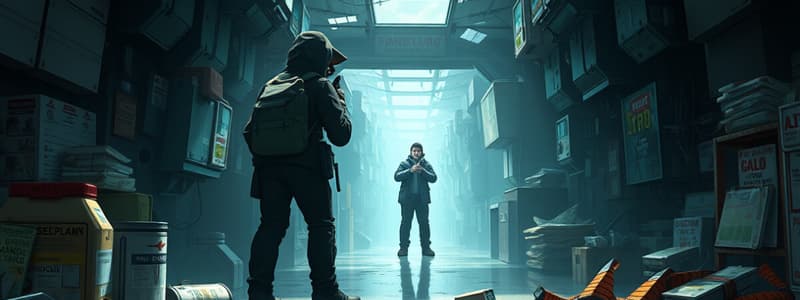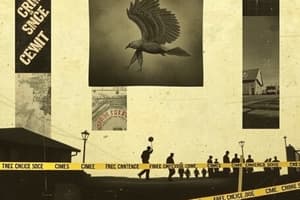Podcast
Questions and Answers
What is the term for the ability to establish the exact whereabouts of an item of evidence?
What is the term for the ability to establish the exact whereabouts of an item of evidence?
chain of custody
What type of evidence proves an alleged fact, such as an eyewitness account?
What type of evidence proves an alleged fact, such as an eyewitness account?
direct
Which factor affects the amount of evidence transferred during a crime except?
Which factor affects the amount of evidence transferred during a crime except?
- Nature
- Intensity
- Perpetrator (correct)
- Duration
What is material that can be related to a single source called?
What is material that can be related to a single source called?
A DNA sample is classified as what type of evidence?
A DNA sample is classified as what type of evidence?
Blood-stained materials should be stored in what type of container?
Blood-stained materials should be stored in what type of container?
Why is it important to separate witnesses at a crime scene?
Why is it important to separate witnesses at a crime scene?
"With contact between two items, there will be an exchange." This is known as _____
"With contact between two items, there will be an exchange." This is known as _____
What do crime scene sketches provide that photographs cannot?
What do crime scene sketches provide that photographs cannot?
How would you correctly describe the evidence item: Shoe print?
How would you correctly describe the evidence item: Shoe print?
Which of the following is a team member on a crime scene team?
Which of the following is a team member on a crime scene team?
Circumstantial evidence tells exactly who is the perpetrator.
Circumstantial evidence tells exactly who is the perpetrator.
Rough sketches are typically drawn to scale.
Rough sketches are typically drawn to scale.
What is used so a reader can understand the symbols used in the sketch?
What is used so a reader can understand the symbols used in the sketch?
Which of the following is true regarding photographs at a crime scene?
Which of the following is true regarding photographs at a crime scene?
What is material that connects an individual or thing to a group that share similar characteristics?
What is material that connects an individual or thing to a group that share similar characteristics?
Which type of evidence is considered direct evidence?
Which type of evidence is considered direct evidence?
In a crime scene sketch, there should always be an arrow to show which way is _____
In a crime scene sketch, there should always be an arrow to show which way is _____
What are the four patterns used to search for evidence?
What are the four patterns used to search for evidence?
What should the first officer do upon arriving at a crime scene after providing medical assistance?
What should the first officer do upon arriving at a crime scene after providing medical assistance?
Flashcards
Chain of Custody
Chain of Custody
A documented trail that tracks the movement and custody of evidence from its collection to the courtroom.
Direct Evidence
Direct Evidence
Evidence that directly proves a fact without inference, such as an eyewitness account.
Circumstantial Evidence
Circumstantial Evidence
Evidence that indirectly implies a fact, like DNA samples.
Evidence Transfer Factors
Evidence Transfer Factors
Signup and view all the flashcards
Individual Evidence
Individual Evidence
Signup and view all the flashcards
Class Evidence
Class Evidence
Signup and view all the flashcards
Blood Evidence Storage
Blood Evidence Storage
Signup and view all the flashcards
Witness Management
Witness Management
Signup and view all the flashcards
Locard's Exchange Principle
Locard's Exchange Principle
Signup and view all the flashcards
Crime Scene Sketches
Crime Scene Sketches
Signup and view all the flashcards
Evidence Description
Evidence Description
Signup and view all the flashcards
Crime Scene Team Roles
Crime Scene Team Roles
Signup and view all the flashcards
Circumstantial Evidence Misconceptions
Circumstantial Evidence Misconceptions
Signup and view all the flashcards
Sketch Legends
Sketch Legends
Signup and view all the flashcards
Photographing the Crime Scene
Photographing the Crime Scene
Signup and view all the flashcards
Searching for Evidence
Searching for Evidence
Signup and view all the flashcards
Securing the Crime Scene
Securing the Crime Scene
Signup and view all the flashcards
Study Notes
Chain of Custody
- Establishes the exact location and control of evidence from collection to courtroom presentation.
Types of Evidence
- Direct Evidence: Directly proves an alleged fact, e.g., eyewitness accounts.
- Circumstantial Evidence: Indirect evidence that suggests a fact – DNA samples classified as circumstantial.
Evidence Transfer Factors
- Amount of evidence transferred during a crime affected by intensity, nature, and duration.
Evidence Classification
- Individual Evidence: Linked to a single source (e.g., specific fingerprints).
- Class Evidence: Connects an individual or item to a group with shared characteristics (e.g., blood type).
Blood Evidence Storage
- Blood-stained materials should be stored in paper bags to prevent contamination.
Witness Management
- Witnesses should be separated at a crime scene to prevent collusion and influence on testimonies.
Locard's Exchange Principle
- With contact between two items, there will be an exchange of evidence.
Crime Scene Sketches
- Provide unique details like distances and dimensions not captured in photographs or videos.
- Rough sketches are typically not drawn to scale.
Evidence Description
- Shoe prints are classified as circumstantial evidence.
Crime Scene Team Roles
- Crime scene team may include the first police officer, medical examiner, and investigators.
Circumstantial Evidence Misconceptions
- Circumstantial evidence does not identify the perpetrator directly.
Sketch Legends
- A legend is crucial for understanding symbols used in crime scene sketches.
Photographing the Crime Scene
- Include close-up photos of injuries and weapons, images of the scene after body removal, and overall positioning relative to the scene.
Searching for Evidence
- Evidence search patterns include spiral, grid, linear, and quadrant methods.
Securing the Crime Scene
- First officer at the scene should secure the area after addressing medical needs and suspects' arrest.
Studying That Suits You
Use AI to generate personalized quizzes and flashcards to suit your learning preferences.


